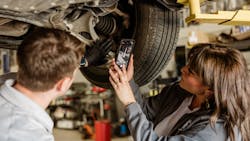In photography, there are two basic categories of camera lenses: prime and zoom.
Zoom lenses do exactly what it sounds like they do—they can change focal length to capture a wide range of images. For example, an 18-200mm lens can capture everything from a super-wide angle landscape shot to a close-up of a football player running down the sideline while the photographer is standing 20 yards away.
Prime lenses, however, are a fixed focal length. A 20mm lens will only be good for capturing wide shots, a 50mm for medium portrait-style shots, a 400mm for close-ups of nature or action in sports, and so on.
On the surface, it may seem like going with a zoom lens is a no-brainer because it can cover all your bases decently well. Why, then, do most professional photographers tend to have a collection of several prime lenses instead of one wide-ranging zoom lens that covers all the focal lengths? It’s because those prime lenses, though slightly less flexible, can be specialized for specific functions and genres of photography. Prime lenses tend to have sharper image quality and other characteristics that lead to higher-quality photos.
Knowing what you’re best at and figuring out ways to harness and focus can be a powerful tool. Whether you’re a photographer figuring out what lens will best fit your subject or an auto repair shop deciding what kinds of vehicles to work on, knowing what you do best and specializing in that niche can be key in helping you stand out from the rest and raise the overall quality of work.
Know Your Customers
A photographer should choose a lens that best fits the kind of genres and subjects they want to capture. So, naturally, the first step for anyone getting into photography is to decide what genre and subjects they want to take photos of.
It’s the same for auto repair shops looking to specialize in a certain make or type of vehicle. Nichole Bennecoff, owner of Empower Automotive in Traverse City, Michigan, says specialization for her shop has come in the form of focusing primarily on Subarus. Her dad started the shop around 25 years ago and was an avid Subaru driver. His love of those vehicles, plus a large emphasis on outdoor culture in their community, made the decision to specialize easy.
“My dad noticed there was a wide need for Subaru repair, so he decided to specialize,” Bennecoff says, “and he’s the type that once he makes a decision, that’s it and he dives in.”
Over on the West Coast, Rocha’s Auto Service in California has specialized in repairing hybrid vehicles for almost 15 years. Ronnie Rocha, along with siblings Yamil and Andrea, took over the business from their dad about five years ago.
“Our dad was non-stop, and he was always looking for something new to learn,” says Yamil, who heads up the repair team at Rocha’s. “He saw hybrids as an opportunity, and we thought it was a great idea. It’s worked out really well for us.”
For both shops, finding their niche was a combination of proactive planning and reactive observation. At Rocha’s, there were already hybrids coming into the shop, which means there was already a sizeable customer pool. They saw hybrids not only as a future customer base to prepare for, but also one that already in need of service and that could sustain an operation.
“Most people can work on hybrids now, but we were one of the first ones to jump on them as soon as we saw them coming down the pipeline,” Yamil says. “When you're the first, you have time to train and learn. That can set you apart.”
In Bennecoff’s case, being in a rural area with a strong nature-focused culture meant that her shop’s customer base was naturally going to be drawn to vehicles that could handle outdoor adventures.
"Our area lends itself to those kinds of vehicles," she says. “Subaru culture permeates throughout our shop.”
Become The Option
It doesn’t matter how good a lens is, if the photographer has no idea how to use it and maximize its strengths, the final photos aren’t going to look that good.
Once your shop decides to specialize, it’s time to invest in training to make sure that not only can you do the work, but to ensure that you can be the best at it in your area. Following their decision to focus on hybrids, Ronnie says his brother immediately got to work researching and learning as much as he could.
“Training was a big part. If you wait until you're totally ready for it, you're never going to do it,” Ronnie says. "You just have to do it and do it all the way. Commit. That's something our dad always taught us."
Yamil says he is constantly training to stay on top of new hybrid technology, participating in classes, conferences, and anything else he can find to keep learning. Whatever he learns he takes back to his team and those who want to are given the opportunity to go to training.
Getting their team involved early and allowing them to play a role helped in the transition to specializing in hybrids. Andrea, who oversees Rocha’s finances, says emphasizing on hybrid repair has given the shop’s techs an opportunity to learn and become experts in their field, which gives them a leg up over other shops in terms of hiring and retention.
“When we started hybrids, there weren't any shops near us that were even touching hybrids, and that was something exciting for employees to be a part of,” Andrea says.
Andrea says they also reached out to shops that were repairing hybrids and asked about what they should be doing, which proved to big help as they navigated the switch.
“That's what Dad always does with any new venture,” she says. “He finds the top shop doing something and reaches out to them.”
Throughout the whole process, Ronnie says that dedication to innovating and providing a service that was completely untouched in their area helped them become the leaders they are today.
“We’ve never been scared to work on hybrids,” Ronnie says. “When we started, we were another option to the dealer. As we learned and progressed, we became the option.”
Stay Flexible
Even though a photographer may have one strength they rely on for a majority of their work, very rarely will they only ever need just one lens. Someone who captures primarily sports photos might also freelance as a wedding photographer, and the lens they use for football games won’t work for close-ups of the bride and groom.
Very rarely is total specialization a viable option. Keeping other lenses in your toolkit and being able to repair other types of vehicles is essential to staying relevant. Recently, Bennecoff says that her shop had almost reached the point of total market saturation with Subarus.
“We're trying to grow and expand our business,” she says, “and we expanded our mailing radius, but there aren't that many more Subarus in our area. If want to grow more, there's not that available pool to draw from.”
Because of that, her shop has recently undergone a branding and philosophy change. Though they still get around 92% of their total business from Subaru repairs, Empower now also works on other Asian makes, such as Honda and Toyota. Bennecoff says the expansion of service is striking a balance between staying loyal to the shop’s current customers while also meeting new needs.
“We wanted to keep similar clientele,” she says, “but we also wanted to be able to service our clients' other vehicles.”
For Rocha’s, hybrids only make up around 25% of their total workload. Andrea says their expertise in hybrid repair makes them a destination for hybrid drivers, but the shop is always trying to innovate and provide new services for their community to keep people coming back.
“In our small town, we tried to bring a lot of things that already existed but weren't available here,” she says. “Whether that's working on hybrids or doing digital multi-point inspections, we're not just providing our customers extra value but also for our employees, too.”
Having a specialty can help set your shop apart and become known as the prime provider for that niche, but your shop must always be constantly evolving to stay relevant and complete picture-perfect repairs for your customers.





